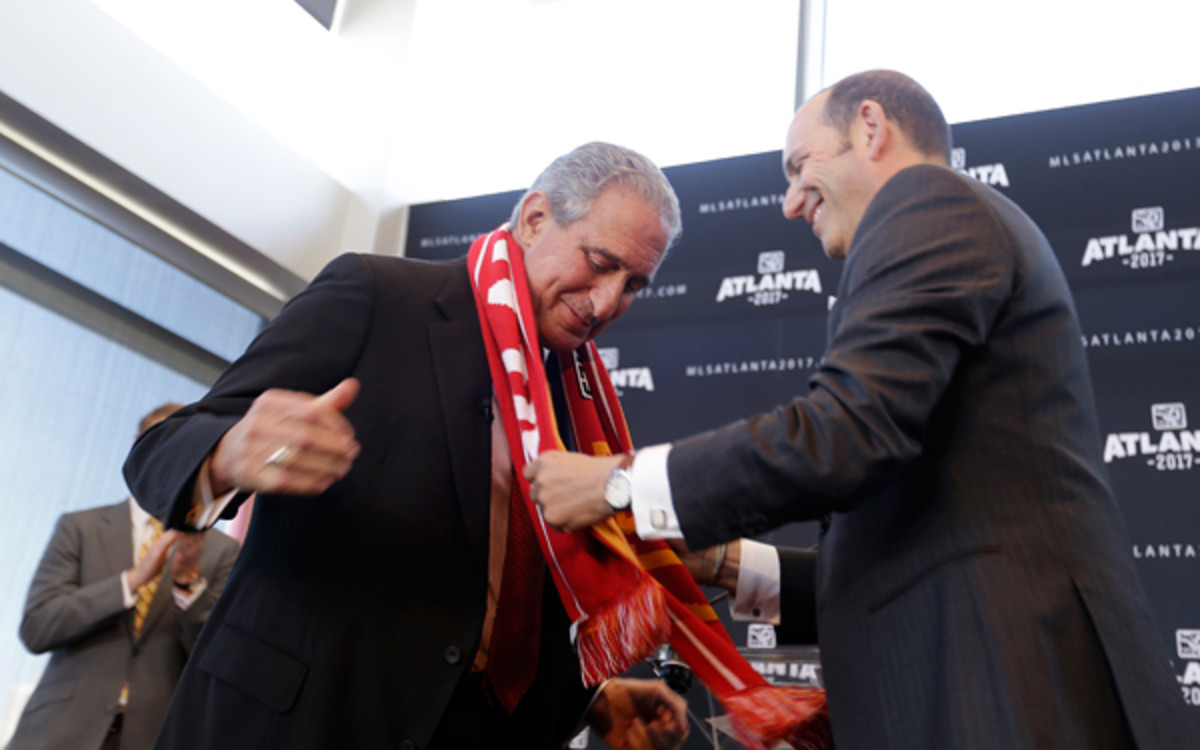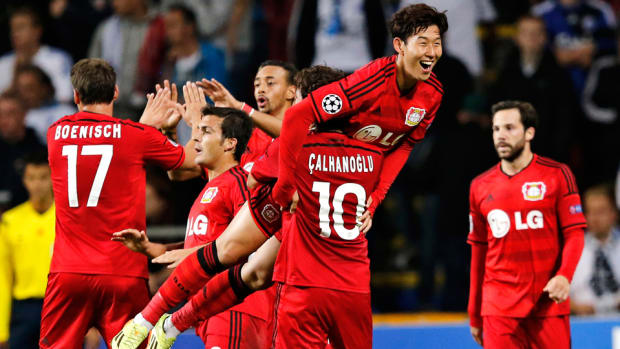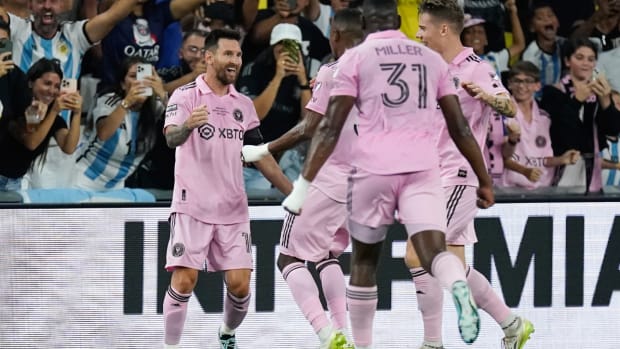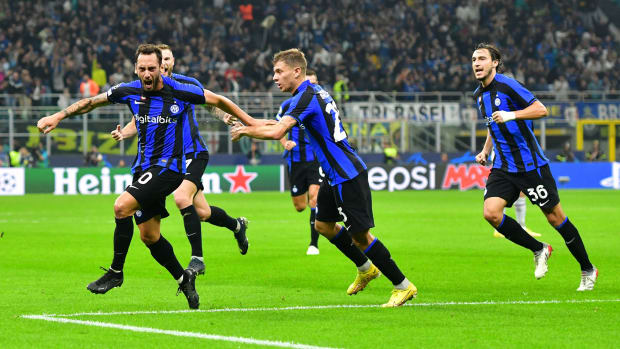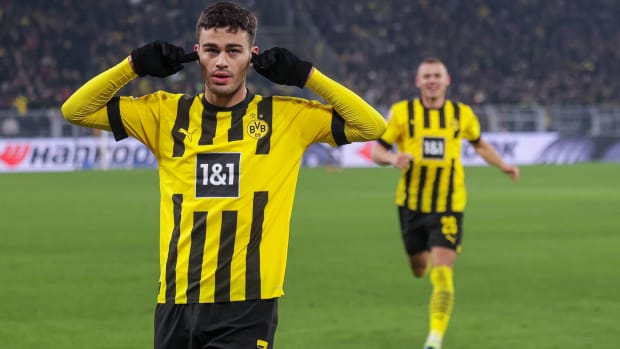With Atlanta on board, MLS shows there's no one-size-fits-all expansion criteria
MLS commissioner Don Garber, right, places a symbolic scarf around new Atlanta MLS franchise owner Arthur Blank. (David Goldman/AP)
Quick, pick the perfect current MLS market. The ideal. The one that has all the right ingredients.
Seattle, Portland and Vancouver come to mind first, but they play in stadiums with artificial turf. The fake stuff is either despised or tolerated, but certainly never preferred. The Timbers’ Providence Park might be a bit too small. BC Place is too large, and the Whitecaps have to share it with a football team.
It’s all going great in Kansas City right now, but what happens when Sporting’s championship core moves on? What if the wins dry up? That’s certainly possible for a “small market” club in the designated player era. Will the novelty wear off in a region that, until a few years ago, didn’t seem to care at all about supporting pro soccer? Then there’s the fact that Sporting Park, while gorgeous, is a solid 15 miles west of downtown. There are restaurants, stores and hotels scattered throughout the adjacent (and vast) Village West complex, but it’s hardly “urban core.”
PPL Park is even further out, 20 miles southwest of Philadelphia. There, the Sons of Ben likely wish they could enjoy the pre- and post-game options available to their KC counterparts. The best things about Chester are the view of the Commodore Barry Bridge from inside the arena and the ramp back on to I-95.
Salt Lake City is too small. MLS needs a TV revenue bump, and the networks haven’t shown much interest in Real Salt Lake despite its consistent excellence. D.C. has the tradition and trophies, but crumbling infrastructure. Toronto boasts the fan support and stadium location but until recently, was burdened with bumbling ownership.
It turns out that it’s pretty easy to find problems, or potential problems, in every market if you look. Selling soccer in the U.S. and Canada hasn't been easy. It requires trial, error, patience, and compromise. Every league has stronger and weaker markets and every city is different. Some MLS clubs that have been around since year one are still trying to find their way.
If MLS has made a mistake in its push toward a continental footprint, it was in laying out specific criteria that expansion hopefuls had to meet. A downtown stadium isn’t realistic in every city. Nor, as K.C. has proven so far, is it required. A demonstrated interest in the sport isn’t compulsory either – just look at Salt Lake. In repeatedly publicizing their expansion wish list, MLS executives glossed over the unique issues facing each potential market and spoke as if each city was the same. They’re not. Some, like New York, are chased. Others, like Orlando, do the chasing. The barrier for entry isn’t and shouldn’t be static.
On Wednesday afternoon, MLS commissioner Don Garber awarded Atlanta Falcons owner Arthur Blank with a red scarf, a big hug and a team that will kick off in 2017. The announcement comes during a week when less-than-ideal news surfaced regarding the league’s expansion plans in NYC and Miami.
CREDITOR: MLS awards Atlanta 2017 expansion club
On Monday, the Miami Herald reported that a consortium led by Royal Caribbean Cruises launched a campaign to block David Beckham's ownership group from constructing an arena at PortMiami. Last week, the paper ran a story detailing some of the concerns Miami-Dade County commissioners have about the potential port site.
"I think there’s a sentiment that it should not be in play,’’ commissioner Esteban Bovo said. "There may be a majority on this commission who do not want it in play."
Also on Monday, The New York Timesconfirmed what everyone expected -- that New York City FC will kick off next year at Yankee Stadium. The juicy bit was the timeline. Coach Jason Kreis' team reportedly will call The House that George Built home for at least three years. That's a lot of games played on a narrow field featuring temporary sod in front of fans seated too far away.
It should be noted that Beckham hasn't officially been awarded a team -- a sign that MLS doesn't consider a stadium a done deal. But NYCFC has, and it received the go-ahead without the stadium plans the league once said it required. Blank's franchise, meanwhile, will play on artificial turf at an NFL facility. It's worked in Seattle and Vancouver, where there's decades of pro soccer tradition and a passionate and committed fan base. Neither of those adjectives are used very frequently to describe Atlanta's sports fans.
Seattle has shared CenturyLink Field with the Seattle Seahawks since the team's inception, but strong attendance has turned it into a fortress. (Ted S. Warren/AP)
Cue the skepticism. Among those wondering if MLS has lost its way are veteran soccer scribe Steven Goff, who wrote in The Washington Post, "one can’t help but wonder whether blind ambition, not to mention lucrative expansion fees, have clouded MLS’s judgement. He implored the league to, "get past the idea of expanding just for the sake of expansion."
Jeff Bradley, another venerable pundit (and SI.com contributor), wrote on his blog, "The NYCFC plan was supposed to be about raising the bar for the league in the nation’s largest media market. Instead, it all seems as makeshift as the team’s temporary home field."
ESPN analyst Taylor Twellman, who played before plenty of empty seats during his years with the New England Revolution, took aim at Atlanta.
"You got to pick the right market. There's a reason why the Pacific Northwest works. There's a reason why. Atlanta only supports one sport - American gridiron football," he said. "Atlanta for me, I'm sorry, on [artificial] turf in a football stadium -- unless they get 40,000 a game, I'm skeptical."
NEWCOMB: The $1.2 billion stadium Atlanta's MLS team will share with the Falcons
Atlanta probably won't get 40,000 a game, Beckham might not build at the port, and NYCFC will have to spend big, get creative and make Yankee Stadium somewhat tolerable while it works out a permanent solution. None if it is ideal. But that doesn't mean expansion wasn't worth doing or that MLS got it wrong.
(And it has very little to do with the fees. Very roughly estimated, the combined contributions of NYCFC, Miami, Orlando and Atlanta come to a total somewhere near $280 million. Each MLS club will pocket some $14 million. You don't risk the future of the league for $14 million, which is equal to a bit more than two years of Clint Dempsey's salary.)
To become one of the best soccer leagues in the world by 2022 -- MLS' stated goal -- it must take a significant leap in revenue. The only pathway to that promised land is through TV, and for that, the league needs big-time rights fees. To get there, it needs a bigger national footprint and it needs to be in big markets. Atlanta is the ninth largest DMA in the country and the biggest currently without an MLS team. Miami ranks 16th. Half of New York would rank third. The only way MLS becomes relevant in those markets (or more relevant, in the case of NYC) is by putting a team there.
NYCFC would rather have its own stadium. But it takes time to get a soccer facility off the ground, especially in an expensive and congested eastern city (see D.C. and Boston). When MLS took Manchester City's money, it was working on a proposal for Flushing Meadows-Corona Park. The league was optimistic. But it underestimated the amount of local opposition and when City and the Yankees came aboard, they asked to take control of the process. The equation changed. In the meantime, playing in a stadium inside the five boroughs (critical to the club's branding) and controlled by one of NYCFC's owners is a best-case scenario under difficult circumstances. There are other things about the club that seem promising, from the appointment of Kreis and sporting director Claudio Reyna to a recently unveiled logo that pays homage to the right City. Every market has its strengths and weaknesses.
Twellman and Goff each highlighted Atlanta's checkered history with pro sports. It's true that the Braves, Hawks and Thrashers (RIP) have had their attendance struggles. But none of those teams was owned by Arthur Blank, who Atlanta mayor Kasim Reed described on Wednesday as the city's "Batman".
"Leadership matters and ownership matters. I certainly didn't decide to support building a $1.2 billion stadium prior to my re-election for nothing," Reed said. "I believe in our leader."
Blank became a billionaire thanks to The Home Depot. He knows how to run a successful business and is heavily involved in the community. Last year, the Falcons played to more than 98 percent capacity at the 74,000-seat Georgia Dome. Yes, football is king -- especially in the south. But MLS vetted Blank for nearly 10 years. The 71-year-old tycoon choked up during Wednesday's press conference when talking about how much soccer meant to his family, while Reed and Garber invoked the city's evolving demographics. Neither Blank nor the league would take this leap unless they saw sufficient numbers of the segments that constitute a reliable MLS fan base.
There are more than 6 million people in the Atlanta metro area. A well-run MLS club featuring a big-name player or two should entice 20,000 of them to come out to a match. Blank got off to a good start on Wednesday when he promised that his black, red and gold-clad team (that fans will help name) would play on a field with no football lines.
"I promise you, whatever resources it's going to take to get us a winning tradition ... you have that commitment from me," Blank said.
And that's what it takes. Commitment. Fake grass doesn't shake the commitment of Timbers fans. Robbie Keane, Landon Donovan and Omar Gonzalez were committed and re-signed with the L.A. Galaxy. Anthony Precourt is committed to launching a new era in Columbus. RSL is committed to an ethos that drives success. Sporting's owners have committed to innovation. Maple Leaf Sports & Entertainment has committed big money to players and a renovation of BMO Field.
